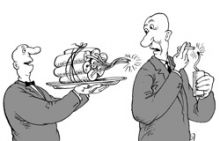Parliament has approved the government action program. One might perhaps say the People’s Deputies had no other alternative in spite of a wide range of choices. That all majority factions would support the program was finally confirmed on the eve of the voting at a meeting of majority group and faction leaders with President Leonid Kuchma. The President must have found convincing arguments for the program to be approved, for even the factions that had earlier opposed this, SDPU(o) and Regional Revival, changed wrath for mercy, saying they would vote in favor.
The Social Democrats, in principle, took the most consistent stand, although their fraction leaders showed some dissonance when the reasons for blocking the program were explained to them. For example, Viktor Medvedchuk stressed that the SDPU(o) opposed not the program itself but the way it was presented to the lawmakers. On his part, faction leader Oleksandr Zinchenko pointed out repeatedly that the program does not describe clearly the mechanisms of its implementation, lacks sufficient social guarantees for the population, etc. Also rather unclear remains the question when the faction decided to support the program. Commenting on program’s approval, Leonid Kravchuk said, “The decision was made before we met the President. On Tuesday after a meeting between Oleksandr Zinchenko and Viktor Yushchenko, it was decided that SDPU(o) will back the program.” However, speaking the next day during the parliamentary debate on the program, Mr. Zinchenko said SDPU(o) would not support it. But later the same day, after the meeting with the President, it became known that the United Social Democrats will be united in support of the government program.
The other faction that declared its support of the governmental program just on the eve of voting is Regional Revival. Its representative Oleksandr Marchenko said the following about the motives for voting in support: “We opposed the government’s program first of all because of its socioeconomic content. But some forces shifted the program support issue onto the political plane. Thus if we have to prove our political support for the government, we will support the program.”
It was thus decided that the government would win the match’s first half, and it did, scoring 261 ayes out of 369 voting. Now, according to the Constitution, Parliament cannot bring down the Cabinet for a year, although it will try to control its actions: on SDPU(o) initiative, a clause on a mandatory quarterly report of the Cabinet to Verkhovna Rada was inserted into the agreed- upon program draft.
Now comes the second half, where a mysterious document called The Agreement on Joint Responsibility of the Government and Parliament will be the prize. This could well bring back the coalition government issue which was successfully hushed up while the program was being adopted. Incidentally, the premier himself, addressing journalists after the program had been approved, did not rule out such a course of events. At the same time, he thinks the most complicated part of the procedure of signing the joint- responsibility agreement has already been passed, and it will be signed shortly. However, this enthusiasm is shared by far from all majority factions, including even those who have been consistently supporting the governmental program.
As to the program itself, even its supporters admit it is a good document as a set of declarations, but it is quite problematic whether it can be used as a concrete effective algorithm of actions. Thus the main result of the program’s approval is that Mr. Yushchenko’s resignation has been put off for the time being. Which the premier can be congratulated on.







